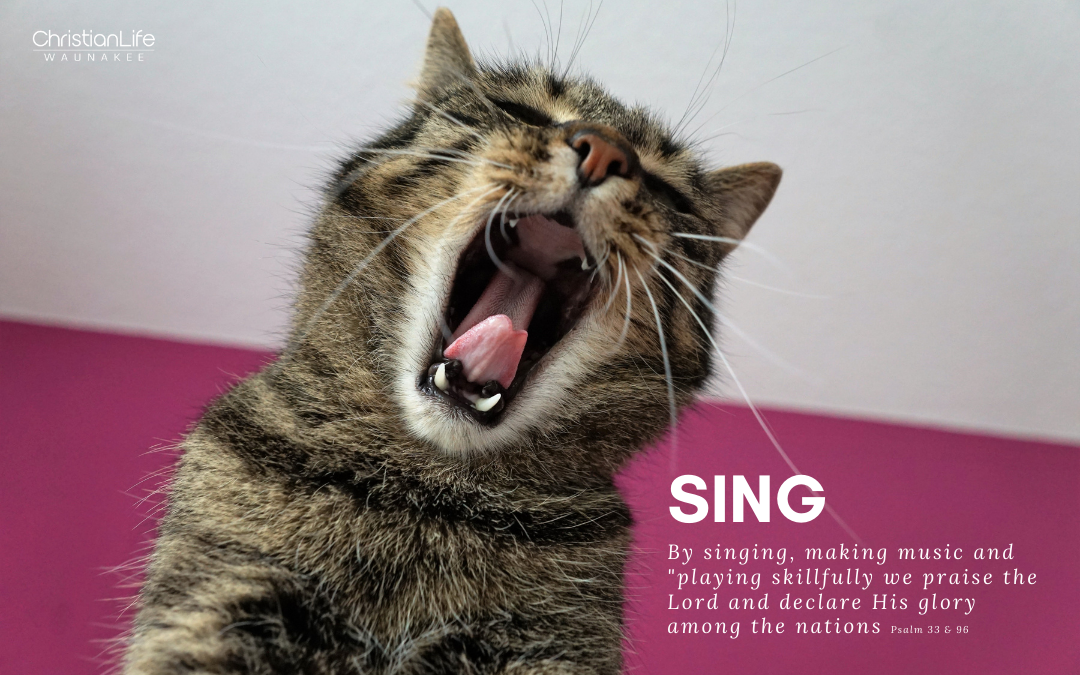Walk into any church, and one of the first things you’ll hear is singing. The style of music you’ll encounter varies. Some churches have a worship band with guitars, a keyboard, and drums. Some have a small orchestra with string and brass instruments. Others just have a single piano or an organ. Some congregations may sing without any music at all. But singing is pretty much a guarantee. Why is that? It turns out singing has a long and rich history of being a vital, vibrant part of worshiping our God.
Overture: Creation?
There’s a little hint in the Bible that singing was part of worship even before humans were created. In Job, God addresses the title character and challenges him to remember, if he can, the very beginning of the universe. God asks if Job was there “while the morning stars sang together and all the angels shouted for joy” (Job 38:7, NIV). Did the stars really sing? It could be poetic rather than literal, but it’s beautiful imagery and a strong indication that song has always been a natural response to experiencing awe at God’s marvelous works.
Act I: Singing in the Old Testament
Songs were significant in Temple and synagogue worship. Without computers or books, singing was an important way for God’s people to remember their history and what God expected of them. A good portion of the Old Testament is actually written in verse form. David, a king of Israel, wrote over 70 of the Psalms, often with directions for musical accompaniment. These “songs” express all kinds of David’s emotions, from grief to anger to joy. They tell stories, praise God, and set prayer to music. Although Psalm 33 and Psalm 96 are not Psalms of David, they are both filled with exhortations and reasons to sing. By singing, “making music,” and “playing skillfully,” we praise the Lord and “declare his glory among the nations”:
“Sing joyfully to the Lord, you righteous;
it is fitting for the upright to praise him.
Praise the Lord with the harp;
make music to him on the ten-stringed lyre.
Sing to him a new song;
play skillfully, and shout for joy.” (Psalm 33:1-3, NIV)
“Sing to the Lord a new song;
sing to the Lord, all the earth.
Sing to the Lord, praise his name;
proclaim his salvation day after day.
Declare his glory among the nations,
his marvelous deeds among all peoples.” (Psalm 96:1-3, NIV)
Act II, Part I: The Early Church
The musical continued into the New Testament after the birth of Christ. In fact, Mary celebrates His birth with a “song” of her own (Luke 1:46-55). When the church was established, it appears that the early believers carried on the tradition of singing as a part of their regular worship. Ephesians 5:18b-19 says, “be filled with the Spirit, speaking to one another with psalms, hymns, and songs from the Spirit. Sing and make music from your heart to the Lord” (NIV). Similarly, in Colossians, Paul says, “Let the message of Christ dwell among you richly as you teach and admonish one another with all wisdom through psalms, hymns, and songs from the Spirit, singing to God with gratitude in your hearts” (Col. 3:16, NIV). Clearly, song remained a vital part of both teaching and praise.
Act II, Part II: Hymns Through the Ages
From Gregorian chants to hymns to spirituals to contemporary worship music, Christians across the centuries have continued to sing. Hymns and songs have played an important role in teaching people about theology and helping them learn Scripture, especially those who could not read or had no direct access to the Bible. While the structure of our songs has changed with time, we still use them to learn/teach doctrine, praise the Lord, and express and share our experiences and joy in knowing Him. The poetry of lyrics helps us explore and understand truth, while music and melody engage our emotions in a way that no other medium can.
Finale: The Future to Eternity
As something that’s been part of the worship of God since the beginning, I’d say it’s safe to presume it’s not going away. In fact, we know there’s at least one new song coming up. Revelation 5:8-10 speaks of the elders around the throne of God who will sing a “new song” worshipping Jesus. Song will be part of the end of days, and it’s likely we’ll keep singing all the way through eternity. So let’s get in some practice and sing from the heart!
—————————————————

